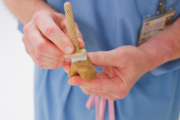My friend Heather was recently describing her experiences after the birth of her first child: “Every day was overwhelming. It was like taking a test I hadn’t studied for over and over again. Meanwhile, everyone seemed to think my life should go back to ‘normal’ immediately. I should go back to work, sleep through the night, and my body should return to its pre-baby form. None of that was happening for me, and it was depressing.”
There are times during women’s lives that involve dramatic physical changes, including puberty, pregnancy and menopause. Hormonal changes are implicated in all of these physical transformations, but the experiences of growing a fetus during pregnancy, delivering a baby and nursing a child can take an especially far-reaching toll — emotionally and physically.
Body Dissatisfaction After Pregnancy
Research suggests that body dissatisfaction often dominates the postpartum experience. On the one hand, this probably seems completely commonsensical, while on the other, our cultural dialogue about “getting your pre-baby body back” seems to dominate discussions of pregnancy and women’s bodies suggesting that postpartum body dissatisfaction is a simple problem to solve.
Women report a great deal of concern about stretch marks, changes to their breasts and overall weight gain associated with pregnancy. These concerns are not merely superficial.
One recent study even suggests that poor body image is often associated with depression postpartum. My friend may have felt like she was the only one not living up to social expectations postpartum, but the research suggests otherwise.
[READ: What Is an Ectopic Pregnancy?]
Breastfeeding and Disordered Eating
Further, women who are dissatisfied with their bodies are more likely to stop breastfeeding before six months and report more embarrassment about breastfeeding. In some of my own research, my colleagues and I found that women with more body image concerns were not only likely to stop breastfeeding but also engage in disordered eating. All of this research suggests that the consequences of women’s body dissatisfaction postpartum may affect not just women but also their children.
I’ve been thinking about all of this a lot in the last few weeks as the realities of a post-Roe world settle in. There are many physical and mental health challenges and complications associated with pregnancy. Although past research examining links between body image and pregnancy do not tend to ask women if they desired their pregnancies, it’s likely that women who agree to participate in such research were glad to be pregnant and have a child. And yet, many of these women struggled with their body image and this had real consequences for their mental and behavioral health.
[READ: Natural Birth Control Methods: Do They Work?]
The Physical Changes of Pregnancy
One of my former students, Lily, shared that she was surprised that books about motherhood gloss over all the physical changes associated with pregnancy. She joked that being told to view stretch marks as a badge of honor is not especially helpful. Lily told me that the messaging about, “getting your pre-baby body back” felt so toxic to her that it really contributed to her dislike of being pregnant and her postpartum body dissatisfaction.
Of course, the experience of pregnancy doesn’t always leave women dissatisfied with their bodies. I know more than one woman who felt empowered by her pregnancy and valued her body less for what it looked like and more for what it was capable of postpartum — even while in the throes of sleep-deprivation.
My friend Katie was trying to get pregnant with her second child when she learned that she had breast cancer. What followed was (successful!) cancer treatment, IVF and eventually a second son. Those years were scary, but the desire to be around to parent her son and have another child were ever-present. Today, she is so grateful for all that her body has been able to withstand and the two boys that she adores. But even she will admit that it’s hard not to wish for her pre-baby body.
[Read: How to Find a Good Fertility Clinic.]
The Consequences of Unintended Pregnancies
It’s difficult to imagine how unintended pregnancies — in some cases, the result of incest or rape — that women are forced to carry, will not have devastating consequences for women’s body image and their mental health in general.
There’s a lot women can’t control when it comes to their ability to get pregnant, to carry a pregnancy to term, to deliver a healthy child and to physically and psychologically recover from these experiences. Women deserve body autonomy when it comes to deciding to embark on this journey.
More from U.S. News
13 Health Pros and Cons of Aspirin
Vitamins and Minerals for Women
11 Signs of Postpartum Depression
Pregnancy and Body Image in a Post-Roe World originally appeared on usnews.com







